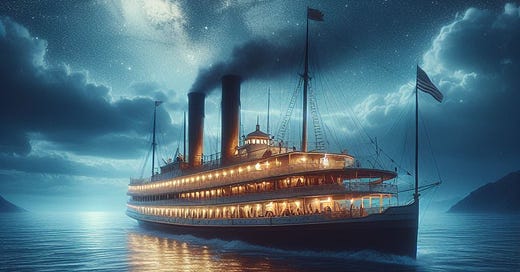On Concepts of Date and Time
"It's one of those things that you may not go bragging about as soon as you step off the boat, but it's definitely a story that will amaze your grandkids." - Sailor on duty at USS Topeka
It is a story about time and space, through an unprecedented event that happened in one special place.
On a warm night in late December of 1899, in the middle of the Pacific Ocean, on the steamboat SS Warrimoo, Captain Phillips was in charge of his ship while doing a regular trip from Vancouver to Sydney. However, this evening was different - the captain planned to do something seemingly impossible that had likely never happened in history.
It was 30 December and the ship was close to two interesting lines - the equator and the international date line. Phillips ordered his crew to change course slightly and get closer to these two lines.
SS Warrimoo crossed the equator and the international date line at midnight. It had unusual consequences for the ship - for that one moment in time the ship was divided into four sections by these two imaginary lines. Each section was in two different:
days (Sunday and Monday)
months (December and January)
seasons (summer in the southern hemisphere and winter in the northern hemisphere)
years (1900 and 1899, also 1900s and 1800s)
Humans have an incredible capacity to wonder. Some things happen only in our imagination. The Earth doesn’t care where we change dates, how many months we have, or how many days a week there are. Still, our drive to do unusual things led another ship to follow in the SS Warrimoo’s steps. It was a nuclear submarine of the US Navy, USS Topeka, 100 years later.
On an equally unusual night on 30 December 1999, at midnight, the US submarine crossed the same lines. This time, it wasn’t just in two different days, months, seasons, and years, but also in two different millennia, as part of the ship was still in 1999 and the other in 2000, marking the start of a new millennium. Crew members were the first to celebrate the new millennium. Later, they crossed the line in the opposite direction and travelled back to 31 December to celebrate New Year’s again.
Both stories are incredible, but for the first one due to technology limitations back then and imprecise navigation, it is hard to believe that it really happened. No evidence confirms SS Warrimoo’s achievement from 1899/1990 and the event wasn't recorded in the captain's log. In 1999/2000 USS Topeka definitely did it, with precise measurement and a press release. It is not sure if they were inspired by their predecessors a hundred years before.
What do you think about these ships?
Just reading these stories feels great. I felt amazement, joy, and a sense of accomplishment for the crew on board each vessel. It reminded me that we live in a world full of things we have made up. Concepts of date, time zones, international date line (IDL) - these are all just concepts, made by humans for humans to operate more effectively together in the world we share.
For me, it was a reminder that we operate in a human-centred world. We often forget how many things would be unusual to aliens visiting our planet. As social creatures, to cooperate together, we have learned to establish names, invent languages, and make concepts. We truly believe in everything we have been creating.
Sometimes, it is good to change perspective. These stories are just a small reminder for doing so - from a cosmic perspective: these ships were just on a relatively small blue planet, somewhere in a solar system. The universe was left equally unimpressed both in 1899 and 1999. However, I'm sure the people reading the stories were impressed.
Thanks for reading!
Post Post Notes
#1 References:
Ship Missed New Year's Eve, But Straddled 2 Centuries | The Seattle Times
The Strange Tale of SS Warrimoo, the Ship That Existed in Two Centuries at Once - Atlas Obscura
https://web.archive.org/web/20070408024639/http://www.csp.navy.mil/topeka/story.htm
#2 My friend Adam sent me the story of SS Warrimoo, published in The Seattle Times, and I haven't been able to stop thinking about writing about it since. Thanks, Adam! You told me that I would like it and I did.





Definitely a reminder that the world of time is human-centric. We obsess over arbitrary markers of time that don't mean anything at all, except to us. Well done!
Those who celebrated new millenium on January 1st, 2000 (twice!) were one year too early ;) Technically (and historically), all parts of USS Topeka were in the same century and the same millenium (different years though).